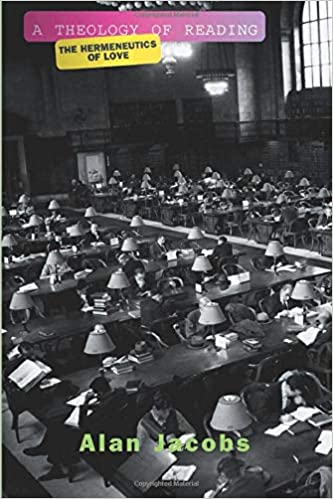
Back when I was a PhD student at Wheaton, I remember coming into the library’s cafe area and discovering a book lying on the table: Alan Jacobs’ A Theology of Reading: The Hermeneutics of Love (Boulder, CO: Westview, 2001). This looks interesting, I thought. And it’s one of the pleasures of PhD days that you can just stop what you’re doing and read something like this. I’m glad I did, and I find myself continuing to return to his insights.
In this book, Jacobs (formerly prof of English at Wheaton, now at Baylor) is talking about how to read books in general, not “special hermeneutics” (how to read the Bible). And his argument is that truly Christian reading will be a reading that fulfills the great command to “love our neighbor as ourselves.” This basic insight changes our reading practices in several ways:
- First, it focuses us on an important goal, which is love of the author. The goal is not first of all to avoid error in interpretation. Rather, “One seeks to avoid error because one cannot love properly when confused or deceived” (p. 17).
- Second, if we love the author, we will truly listen to him/her. We owe all books a debt of faithfulness, of loving attentiveness, Jacobs argues, “because those books become, for the duration of our reading and perhaps long afterward, our neighbors” (p. 64).
- Third, we will avoid “using” books in a selfish way, to gratify our pleasures or to encourage proud self-congratulation. Jacobs challenges us that we have (whether we realize it or not) a choice as we read: we may either see a book as a gratification of our passions or we may wish the best for that book (pp. 30–31). Of course, we can have our favorites, our “friends.” “But if our love is only preferential—if we select some books as the proper and worthy recipients of our love, while excluding others from that charmed circle…—it fails to achieve genuine Christian charity.” (p. 32). We should seek to read broadly as a way of showing love broadly.
- This involves some risk for us as we read people who think differently from us. As Bakhtin wrote, if you read the text in your own voice, “refusing to be put to the question by the voice of the other”, then you are engaged in “safe” reading, not risking anything in the act of reading (cited on p. 33). Thus, Jacob writes, “Loving contemplation … is best described through specifying what it does not do: It [refuses to] circumscribe a work within rigid boundaries, ignoring all elements of the work that cannot be assimilated to a presupposed theoretical schema…” (p. 53).
- Still, we have to remember our ultimate love is for God. As Augustine wrote, “a brief and true definition of virtue is rightly ordered love” (City of God 15.32, cited on p. 22). Jacob applies this as follows: “Charitable reading does not require the reader to abdicate personal responsibility in favor of authorial dictation” (p. 24). In other words, we want to be receptive to how people are challenging us, but we also should question the likes of Nietzsche! To fail to do this would compromise our love of God.
- Still, even for people whose theology is deeply flawed, charitable reading encourages hope. Love hopes all things (1 Cor 13)! Jacobs once more: “Charitable readers do not calculate the likelihood of reward for their loving attention, but their commitment to hope is a kind of calculation, a wager on the graciousness of God and on the imago dei present in the writers of books” (p. 148).
Personally, I feel that this attitude of love toward the authors of books has given me a great deal of joy in reading. It’s expanded my horizons to be able to enjoy the likes of David McCullough, Leo Tolstoy, and George Eliot, among many others. These non-Christians have become “friends” to me because of our shared humanity. They have taught me a great deal, even though I must part company with them in some of their core commitments.
One of the joys of being Reformed is knowing that total depravity does not erase the image of God entirely. We can say with Emerson to all people (including all authors!): “In my walks, every man I meet is my superior in some way, and in that I learn from him.”

Good stuff!